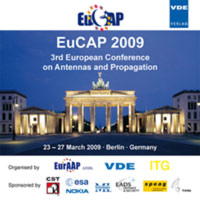Performance Evaluation of Threshold-Based UWB Ranging Methods – Leading Edge vs. Search Back –
Konferenz: EuCAP 2009 - 3rd European Conference on Antennas and Propagation
23.03.2009 - 27.03.2009 in Berlin, Germany
Tagungsband: EuCAP 2009
Seiten: 5Sprache: EnglischTyp: PDF
Persönliche VDE-Mitglieder erhalten auf diesen Artikel 10% Rabatt
Autoren:
Haneda, Katsuyuki; Vainikainen, Pertti (SMARAD Centre of Excellence, Helsinki University of Technology (TKK), Finland)
Takizawa, Ken-ichi; Takada, Jun-ichi (Medical ICT Group, National Institute of Information and Communications Technology, Japan)
Takada, Jun-ichi; Dashti, Marzieh (Department of International Development Engineering, Tokyo Institute of Technology, Japan)
Inhalt:
Accurate ranging is one of the most promising applications of ultra wideband radio in sensor networks. Amongst variety of ranging methods, threshold-based ranging is a primitive, but robust technique suitable for battery-limited systems. This contribution reports the performance of two threshold-based ranging methods: leading edge detection and search back method. The evaluation utilized real-world measured propagation channels and followed the band plan and the transmit power restriction of the IEEE802.15.4a-2007 standard. Effects of the system bandwidth and the center frequency on ranging performance were analyzed. The following conclusions were obtained from the analyses: 1) the leading edge detection outperforms the search back method; 2) accurate ranging in the low band is promising even under the transmit power restrictions, while the use of the high band necessitates a fundamental countermeasure to improve the limited signal level at the receiver; and finally, 3) use of the wider bandwidth does not always provide better ranging performance.


